Irving Stover and The Stover Theatre Collection

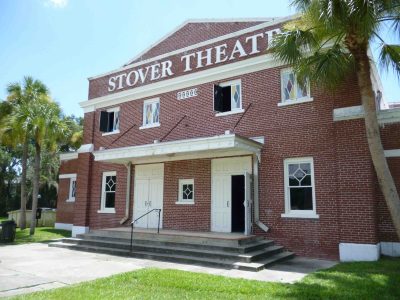
Speaking to The Stetson Reporter in 1955, Professor Irving C. Stover estimated that, “ninety percent of the people who came to see the first play I directed were seeing a drama for the first time in their lives…” Perhaps this explains, in part, why Stover garnered such an enthusiastic following at Stetson and in DeLand.
Professor Stover began his 55-year career at Stetson in 1908 when President Lincoln Hulley, a personal acquaintance, appointed him as Professor of Speech and Elocution. Stover promptly took over the Dramatic Club, rebranded it as the Green Room Club, and began staging Stetson’s first serious theater productions. Over the course of his tenure at Stetson, Stover would go on to direct, and sometimes perform in, hundreds of plays, in addition to teaching drama and speech classes.
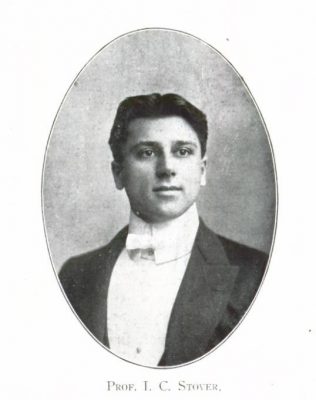
Remembered as handsome and immensely talented, Stover was a beloved figure on campus and among DeLandites. He was considered a serious thespian, some said capable of being a famous actor in his own right, who instead focused on building his students’ self-confidence and strength of character. “The training drama students receive is invaluable in later life,” he opined. “The rehearsals especially are good discipline, and the student learns the creative art of being another person.”
Among the challenges Stover faced in his early years at Stetson was President Hulley’s own interest in the dramatic arts. Hulley, a famously autocratic administrator, was a prolific poet and dramatist who penned over one hundred plays and insisted that Stover stage them on campus. Stover was reluctant to do so, confiding in longtime staff member Olga Bowen that Hulley’s plays had “no point,” were of poor quality, and difficult to stage. Hulley, for his part, told Olga that his plays were “better than Shakespeare’s,” prompting Stetson historian Gilbert Lycan to note “the inability, oftentimes, of a writer to judge the merits of his own writings.”
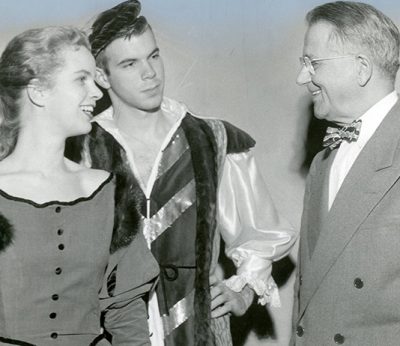
In those days, Stetson’s theatrical productions were staged in the University Auditorium or outdoors, under the oaks of the Forest of Arden. Stover long campaigned for a true theater, which the president finally agreed to build; perhaps, as Lycan suspects, so that Stover would then produce Hulley’s plays in the new venue. The structure was completed in 1930 and named the Women’s Assembly Hall in order to skirt controversy with the Florida Baptist Convention, whose members were concerned that a theater would encourage off-color entertainment and perhaps, immoral behavior. The misnomer did not prevent the show from going on, however. In 1938, four years after Hulley’s death and thirty years after Stover’s arrival, Stetson students insisted that the building be named for the man who devoted so much of his life to it: the venue then became known as the Stover Little Theatre, later shortened to the Stover Theatre.
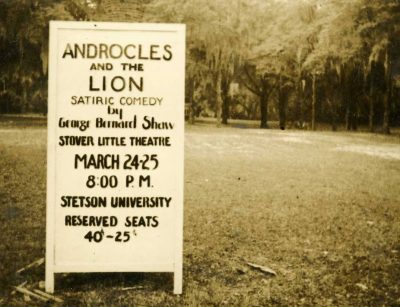
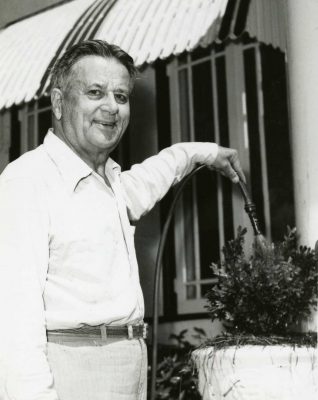
When Irving C. Stover passed away in 1965, some believed that his spirit had never truly left. Rumors persisted that the building was haunted by its namesake, and by 2008, stage managers had established a tradition of communing with the spirit of Stover himself when alone in the dark of the theater – sometimes to invite him to performances, sometimes to request his help. Though the small brick theater was demolished in 2012, and Stetson’s Theatre Arts productions have moved on to the Second Stage Theatre in the Museum of Florida Art, neither Irving nor the storied venue that bore his name have been forgotten.
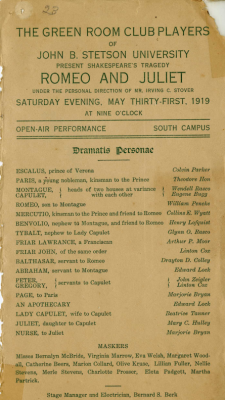
Among the University Archives & Special Collections’ holdings are the Stover Theatre Collection, which documents campus theatrical productions; and a collection of memorabilia from the Stover family, much of it courtesy of Stover’s granddaughter, Nancy Wheaton. And, if you would like to judge for yourself if President Hulley’s plays were any good, we have those, too! Most Stover items may be viewed online at the Stetson Digital Archives or accessed by appointment in the Archives & Special Collections office.
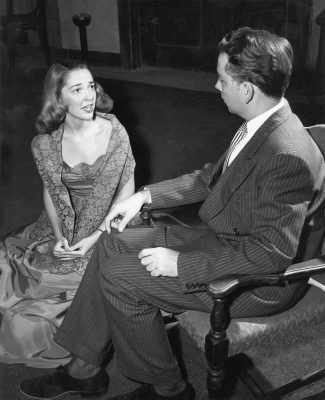
-By Kelly Larson
Archivist
Archives & Special Collections
duPont-Ball Library
Citations: Lycan, G. (1983). “Stetson University: The First 100 Years.” DeLand, FL: Stetson University.
“Dr. Stover Completes 48 Years as Theater Director.” (1955, November 18). The Stetson Reporter, pp. 2,7.



